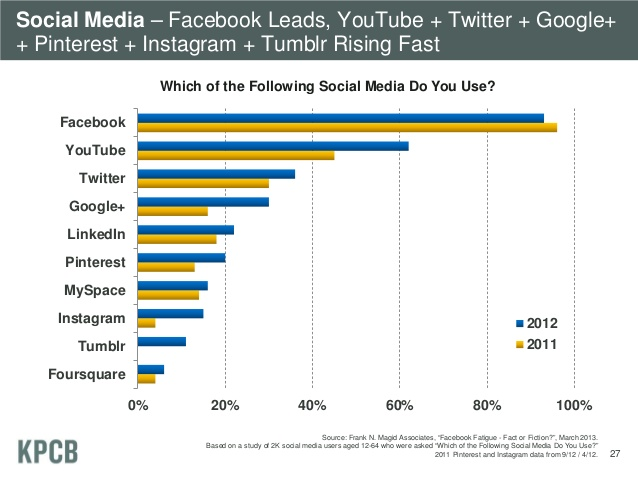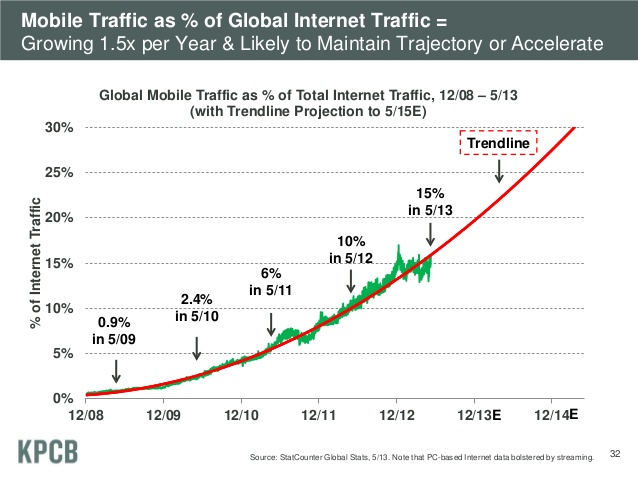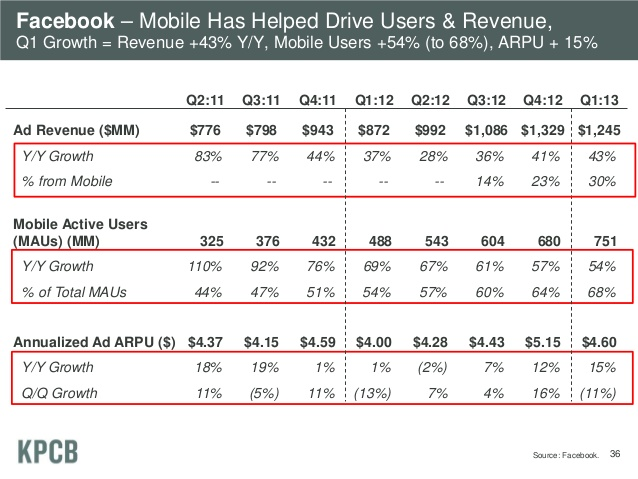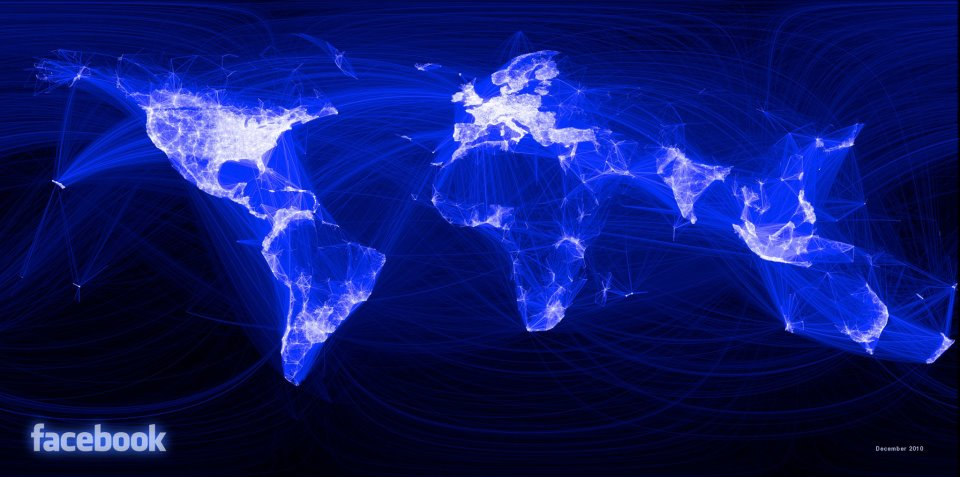
Via Facebook
Facebook has always had the goal of becoming more than a social network, becoming a utility of sorts. As early as 2005, CEO Mark Zuckerberg was espousing this goal.1 Somewhere along the path to this goal, Facebook has become uncool, as Zuckerberg has said. While visiting Washington D.C. to lobby for immigration reform, Zuckerberg was asked about Facebook losing the ‘cool-factor’ with teens and what that may mean for the company, to which he replied: “People assume that we’re trying to be cool. That’s never been my goal — I’m like the least cool person there is.”2 Zuckerberg continued, arguing for Facebook in terms of a utility, “Maybe electricity was cool when it first came out, but pretty quickly people stopped talking about it because it’s not the new thing, the real question you want to track at that point is are fewer people turning on their lights because it’s less cool?”3
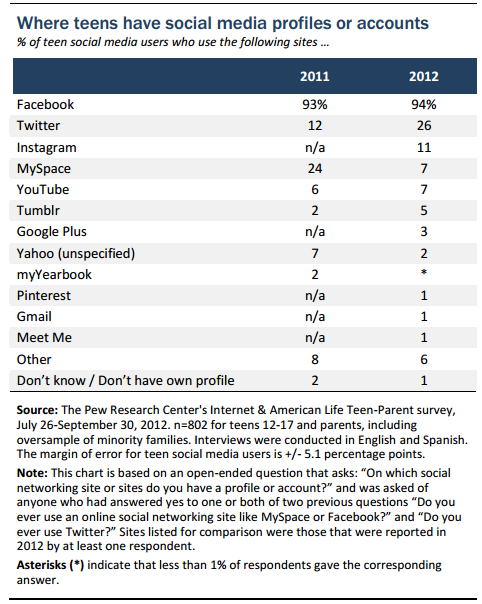 It must have come as no surprise, then, that Twitter has overtaken Facebook as the most influential social network among teens, in terms of influencing purchases.4 Further, a May 2013 Pew Research Report on “Teens, Social Media, and Privacy,” found that 94% of U.S. teens aged 12-17 have a Facebook profile(See table left).5 Thus, while Facebook is, perhaps, losing its power to influence, it is hardly losing ubiquity.
It must have come as no surprise, then, that Twitter has overtaken Facebook as the most influential social network among teens, in terms of influencing purchases.4 Further, a May 2013 Pew Research Report on “Teens, Social Media, and Privacy,” found that 94% of U.S. teens aged 12-17 have a Facebook profile(See table left).5 Thus, while Facebook is, perhaps, losing its power to influence, it is hardly losing ubiquity.
If indeed Facebook is losing their hold on the teen demographic, it is not reflected in the companies’ third quarter 2013 earnings report. A few highlights from the report stand out:
Usage
- Daily active users (DAUs) were 728 million on average for September 2013, an increase of 25% year-over-year.
- Monthly active users (MAUs) were 1.19 billion as of September 30, 2013, an increase of 18% year-over-year.
- Mobile MAUs were 874 million as of September 30, 2013, an increase of 45% year-over-year. Mobile DAUs were 507 million on average for September 2013.
Revenue
The total Q3 2013 revenue for Facebook totaled $2.02 billion, an increase of 60% year-over-year.
- Revenue from advertising was $1.80 billion, a 66% increase from the same quarter last year.
- Mobile advertising revenue represented approximately 49% of advertising revenue for the third quarter of 2013.6
Facebook’s COO, Sheryl Sandberg, spoke with Mike Isaac of AllThingsD and debunked some of the widespread teen emigration claims. In response to Issac’s question on the topic, Sandberg answered:
I think the reaction to that comment has been blown out of proportion. As we said on the earnings call, overall U.S. teen usage of Facebook remains stable…The vast majority of U.S. teens are on Facebook. And the majority of U.S. teens use Facebook almost every day…One of the challenges we face right now is that we’re a decade old. That means that we’re not the newest. And often, particularly in our space, newer things are shinier and cooler.And what Mark [Zuckerberg] has said and what we all believe is that we’re not trying to be the coolest. And we’re not trying to be the newest. We’re trying to be the most useful. I think if you look at the way teenagers continue to use Facebook, we are useful to them.
– Sheryl Sandberg 7
While teens’ purchases may not be influenced by Facebook to the extent they were in the past, the social utility – née social network – is anything but doomed. In fact, Facebook seems better positioned than ever, in the grand scope of things, to become even more of a powerhouse. Just take a look the three charts from Mary Meeker’s 2013 Internet Trends report below, and it becomes quite clear that talk of Facebook’s demise have been completely exaggerated, mostly for the sake of page-views:8
Total Social Media Usage
Mobile Internet Usage
Facebook Mobile Growth
So, it seems as if the reports of teens leaving Facebook is not only baseless, but seemingly insignificant to their bottom line. If, indeed they are leaving, it seems as though the exodus is making Facebook more profitable. Speculation aside, it looks like Facebook can and will deliver on its promise of adding 5 billion users in the not so distant future.9
- Harry McCracken, Time Tech, “Of Course Facebook is a Utility!,” Nov. 17, 2013. McCracken makes the case that the utility status has always been Facebook’s end goal, and points in particular to a 2005 article written by Jeff Claiver, the founder of SoftechVC, “The Facebook unplugged at Stanford ETL.” ▲
- Emma Green, The Atlantic, “Mark Zuckerberg: Neither Republican, Democrat, Nor Cool,” September 18, 2013. ▲
- Josh Constine, TechCrunch, “Facebook Doesn’t Want To Be Cool, It Wants To Be Electricity,” September 18, 2013 ▲
- Piper Jaffray & Co., “Piper Jaffray Completes 26th Semi-Annual “Taking Stock with Teens” Market Research Project,” October, 10, 2013. It should be noted that journalists have been playing fast and loose with this report. The topic was not which is the most important social network in general, but rather which is the most important in influencing purchases. ▲
- Pew Research Center, “Teens, Social Media, and Privacy (PDF),” May 21, 2013. P. 25. ▲
- All statistics and notes are from “Facebook Reports Third Quarter 2013 Results” on the companies Investor Relations website. ▲
- Mike Issac, AllThingsD, “Sheryl Sandberg Says Facebook Totally Doesn’t Have a Teenager Problem,” November 22, 2013. This is really an excellent interview, that covered a wide range of topics from the attempted Snapchat acquisition, to mobile ad units. Really worth checking out. You should follow Mike Issac on Twitter as well. ▲
- All charts can be found in: Mary Meeker and Liang Wu, KPCB Insights, “2013 Internet Trends” May 2013. Chart 1: p 27; Chart 2: P. 32. Chart 3: P. 36. ▲
- Jim Edwards, Business Insider, “Mark Zuckerberg Has A 27-Year Plan For Adding Another 5 Billion Users On Facebook,” July 27, 2013. ▲


